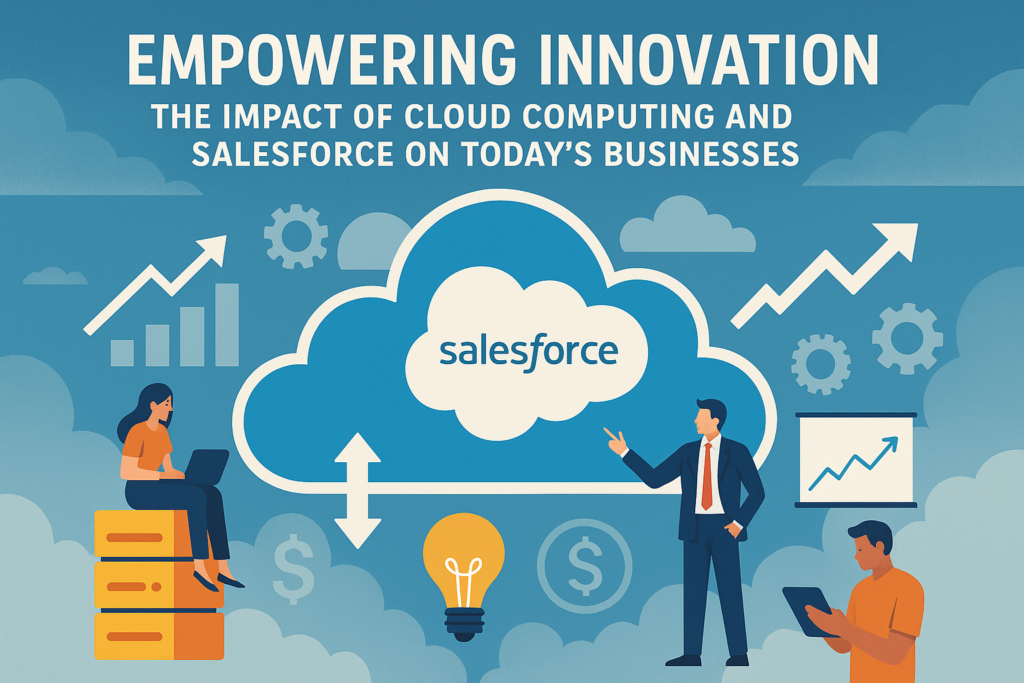Empowering Innovation: The Impact of Cloud Computing and Salesforce on Today’s Businesses
In today’s fast-paced digital era, businesses are under constant pressure to innovate, scale efficiently, and deliver exceptional customer experiences. The convergence of cloud computing and Salesforce has redefined how organizations operate, making digital transformation accessible, affordable, and impactful for companies of all sizes.
Let’s explore how this powerful combination is transforming modern business landscapes across industries.
1. Understanding Cloud Computing: The Foundation of Digital Transformation
Cloud computing has revolutionized the way businesses access, store, and process data. Instead of relying on physical servers or local infrastructure, organizations can leverage cloud-based platforms that offer:
-
Scalability: Instantly increase or decrease computing resources based on demand.
-
Cost Efficiency: Pay only for what you use—no upfront investment in hardware.
-
Accessibility: Securely access data and applications from anywhere, at any time.
-
Collaboration: Teams across the globe can collaborate in real-time using shared data and tools.
In essence, the cloud eliminates traditional IT constraints, empowering companies to innovate faster and respond quickly to market changes.
2. Salesforce: The Cloud Leader Transforming Business Operations
At the heart of this cloud revolution stands Salesforce, the world’s leading Customer Relationship Management (CRM) platform. Built natively on the cloud, Salesforce helps organizations manage every aspect of their customer journey—from marketing and sales to service and analytics—on a single, unified platform.
Key features that make Salesforce indispensable include:
-
360° Customer View: Centralizes all customer interactions, ensuring personalized engagement.
-
Automation: Streamlines repetitive tasks and business workflows for increased productivity.
-
AI-Powered Insights (Einstein AI): Provides predictive analytics and smart recommendations to guide decision-making.
-
Integration Ecosystem: Seamlessly connects with third-party applications and systems through APIs and AppExchange.
-
Scalability & Customization: Adapts to business needs, regardless of company size or industry.
Salesforce enables businesses to not only understand their customers better but also act intelligently and faster in a competitive environment.
3. The Synergy Between Cloud Computing and Salesforce
Cloud computing provides the foundation; Salesforce builds the ecosystem.
This synergy allows businesses to:
-
Accelerate Innovation: Developers can build and deploy new applications quickly using Salesforce’s low-code tools like Lightning App Builder and Flow.
-
Enhance Collaboration: Cloud-based data sharing ensures every department—from marketing to customer service—works with real-time, unified information.
-
Enable Remote Work: With Salesforce’s mobile and web access, employees can manage customers and operations from anywhere in the world.
-
Ensure Data Security: Cloud infrastructure coupled with Salesforce’s compliance standards (GDPR, ISO, SOC) ensures enterprise-grade data protection.
Together, cloud computing and Salesforce remove barriers to agility, helping businesses adapt faster and innovate without limits.
4. Real-World Impact: Transforming Industries
Salesforce and cloud computing have revolutionized operations across multiple sectors:
-
Retail: Personalized shopping experiences driven by data analytics and AI-powered recommendations.
-
Healthcare: Patient data management and telehealth integration ensure seamless, connected care.
-
Financial Services: Secure, compliant platforms that support digital banking and client engagement.
-
Manufacturing: Smarter supply chains with predictive maintenance and real-time tracking.
-
Education: Cloud-based platforms like Salesforce Education Cloud enable remote learning and student success management.
Each industry leverages the scalability and intelligence of cloud technology to deliver better outcomes and higher customer satisfaction.
5. Driving a Culture of Innovation
Perhaps the greatest impact of cloud computing and Salesforce is cultural. Organizations are moving away from rigid, siloed systems toward agile, collaborative, and data-driven environments.
-
Teams can experiment, test, and deploy ideas faster.
-
Leaders can make informed decisions with real-time analytics.
-
Employees can focus on creativity and customer engagement instead of manual processes.
This cultural transformation fuels continuous innovation—turning technology into a strategic advantage.
6. The Future: AI, Automation, and Hyper-Personalization
As Salesforce continues to integrate AI (Einstein Copilot), automation, and data unification (Data Cloud), businesses will experience even greater levels of intelligence and personalization.
Imagine AI-driven customer journeys, real-time sentiment analysis, and predictive forecasting—all seamlessly powered by the cloud. This is not the future—it’s happening now.
Conclusion
The impact of cloud computing and Salesforce extends far beyond technology—it’s about empowering innovation, enabling growth, and redefining customer relationships.
By embracing these platforms, businesses can unlock unprecedented efficiency, agility, and customer satisfaction—staying ahead in an ever-evolving digital economy.
In the new era of business, cloud is the foundation, and Salesforce is the catalyst—together, they are shaping the future of innovation.

